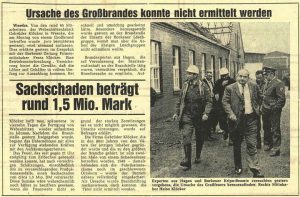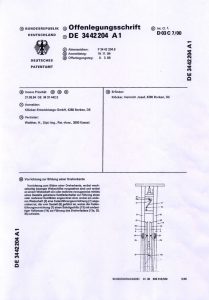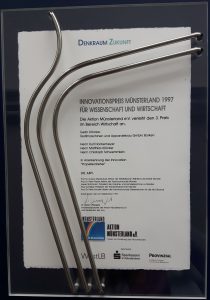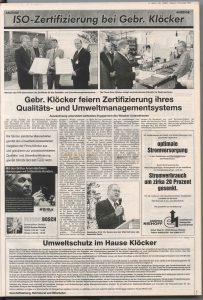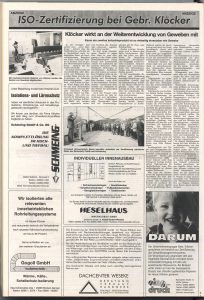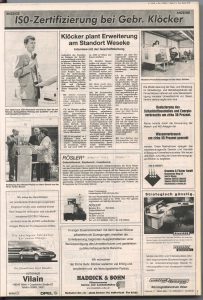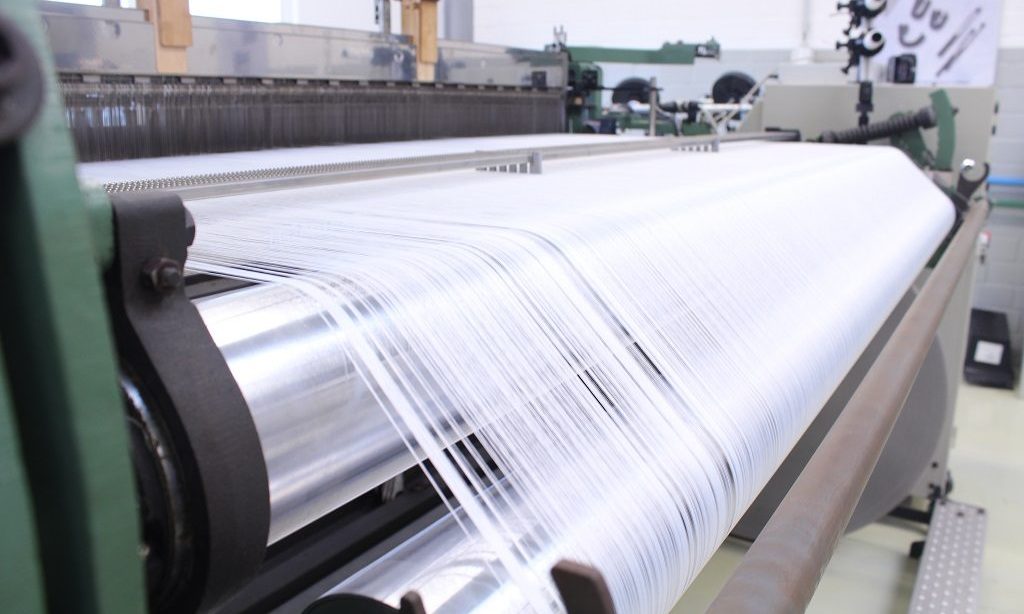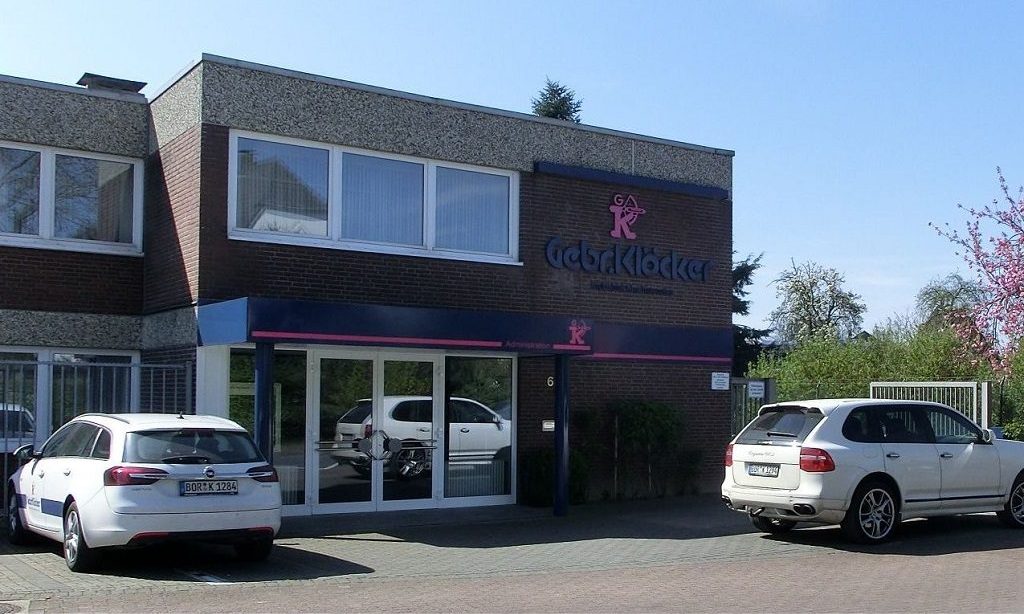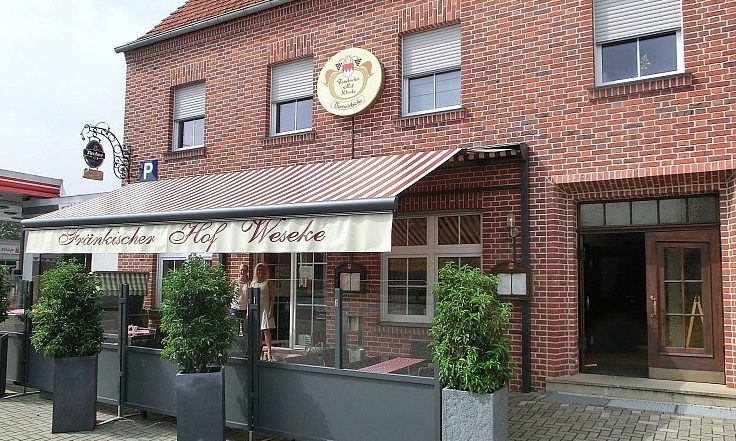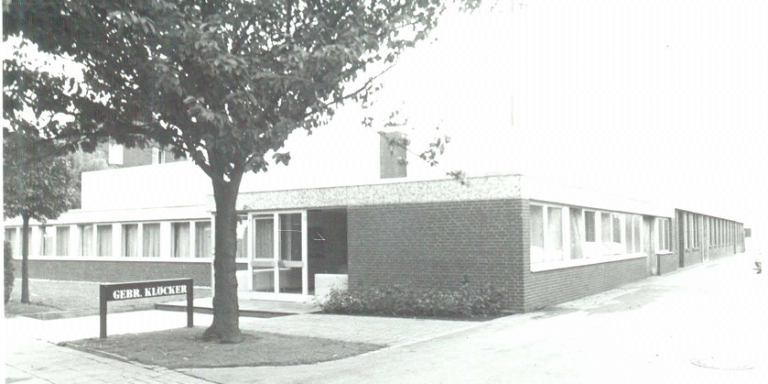
Company History
- 1846
The history of Klöcker Bros. goes back to almost 300 years. First official records of the company from Borken date back to the year 1846. All documents subject to the older history of Klöcker unfortunately have been destroyed in two serious fires.
Klöcker Bros. always have sustained their position in the market without any subventions, initially with the production of high-quality furniture at the original site opposite the church in the centre of Borken-Weseke.
The industrial revolution especially benefits the expansion of the textile sector in the Münsterland region in Western Germany. For this reason, accessories on wooden basis for mechanical weaving looms are being included in the production program in the course of time. Within the scope of this development, Klöcker Bros. focus on the production of weaving shuttles in the textile division and become known worldwide as one of the leading quality suppliers for automatic weaving shuttles during that time.
- 1900
As a German manufacturer of shuttles, Klöcker starts to produce metallic spare parts for textile industry by the beginning of the 20th century, particularly since alternative raw materials increasingly replace wood throughout the general machine building.
Nevertheless, furniture keeps being produced simultaneously.
Directly after the second world war, the original site at Flopsplatz in the centre falls victim to a fire. Insurance assets – paid out in Reichsmark in record time – are practically worthless due to the upcoming monetary reform. However, the reconstruction of the company is effected by the unprecedented personal commitment of the owners of that time, Messrs. Heinz and Franz Klöcker.
- 1948
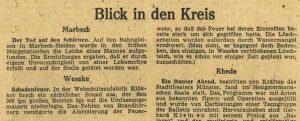
Consequently, a new start is being made at today’s site at Hauptstrasse in the year 1948: The furniture sector is being given up in favour of an intensification of production of accessories for textile machinery. Klöcker Bros. construct a new building at today’s premises. A new department for mechanical accessories is being established.
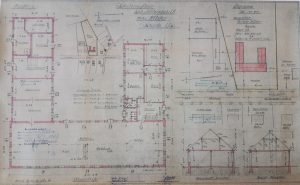
During the 60s and 70s, the weaving loom is subject to essential innovations. The conventional spindle shuttle is being replaced by the automatic shuttle reaching considerably higher speeds. The automatic shuttles are still made of compressed wood and form the focus of the product range. Klöcker has never responded to the qualitatively inferior spindle shuttle being made of plastic and being injected thousandfoldly in China even today. - 1974
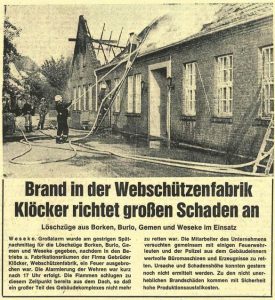 In 1974, a serious fire destroys the company Klöcker at its new site at Hauptstrasse again. There are rumors about malicious arson. The building is being reestablished. Two other halls follow during the next years.
In 1974, a serious fire destroys the company Klöcker at its new site at Hauptstrasse again. There are rumors about malicious arson. The building is being reestablished. Two other halls follow during the next years.
At the end of the 70s, the textile branch in the Münsterland region experiences a dramatic upheaval. Low-wage countries pose a serious problem for the local industry. The market is being conquered by the automated weaving machines transporting the filling yarn by so called projectiles, rapiers or by air or water power at considerably higher speeds than weaving shuttles may reach. Up to 1.200 picks per minute are being realized in operation today – for demonstration use on exhibitions, even 2.000 picks may be achieved.
- 1984
- 1990
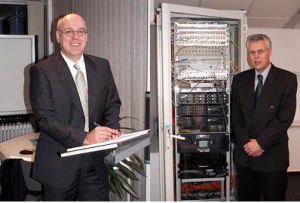
Within the scope of a change in leadership in 1990, the owners of that time, Messrs. Heinz and Franz Klöcker, surrender the responsibility for the company without any reservation to their successors and today’s managing partners Matthias Klöcker and Dr. Christoph Schwemmlein who expand the development department in Borken successively.Mechanical versions are being optimized step by step in terms of material. Amongst others, carbon fiber composites are being used. Later, mechatronical components, adjusted to modern models of weaving machines, are being converted additionally. Special importance is being attached to the so called CAN-Bus connection.
By beginning of the 1990s, Klöcker supervises the first student being about to take the diploma and henceforth focuses on maintaining close cooperation with schools of higher learning at home and abroad, going along with underwriting academic pursuits of Diploma’s and later on Bachelor’s and Master’s degrees on a regular basis.
- 1995
Subsequently, the production of weaving shuttles is being outsourced to Indonesia during the mid 90s, a production site for accessories for textile machinery is being established in Bandung. Nevertheless, the assortment as well as cutting, drying and pressing of the required raw material for weaving shuttles – white beech wood from Croatia – is being still carried out in Borken due to the know-how available at the site in Germany.
The new plant SKD resists the upcoming Asian crisis, particularly since weaving machines based on shuttles are widely spread at that time and the company is well positioned in terms of capital. Applying the most modern production and working methods, the company PT. SKD develops from a pure manufacture for weaving shuttles to a powerful production plant in the range of mechanical accessories for textile machines during the years. SKD produces on an area of approximately 6.000 m² being subject to two own major halls and subsidiary buildings at the former site in Bandung.
- 1997
- 2000
At the turn of the millennium, Klöcker implements a quality and environmental system according to DIN EN ISO 9001 and DIN EN ISO 14001 respectively after having passed the extensive examination through the Technical Inspection Authorities in charge, while the Indonesian site follows the relevant guidelines as well. Numerous guests from economy, politics and administration participate in celebrating the certification.
For many decades, tools have only been constructed for internal purposes at Klöcker. The experiences having been developed to a profound know-how in this range are being used by the company for contract manufacturing by beginning of the new millennium, while expanding business activities by the field tool manufacture and construction. The new division in Borken is being completed by comprehensive investments in machinery, high-qualified staff as well as reliable C-technologies. After three wars and two inflations, Klöcker Bros. are optimistic to sustain their success story by making an advance in tool manufacture.
- 2011
- 2012
In 2012, the production of weaving shuttles is being shut down in favour of focussing on tool engineering and moulding technology according to plan, thus considering the trends in view of the structural development in the textile markets which may be observed in the long run. Decisive factors are the long-term basis with the acquisition of the raw material on the one hand as well as globally rising energy costs on the other.
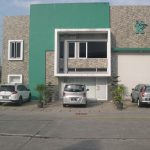
SKD sells the machinery being adapted to the production of weaving shuttles and moves into the new location at Bandung Biz-Park in order to adequately attend the extended production program. The production of industrial parts for the automotive and air conditioning sector is being focussed from now on.
At the same time, the released area at the site in Borken is being used to build up an assembly line for the newly developed K-GLASS® Selvedge Motion product range, going along with the fabrication of all necessary injection moulds and special tools for manufacturing the needles and effecting the superfine polishing. The K-GLASS® Selvedge Motion satisfies as unique feature the special demands of finest electric glass being used for the production of all current circuit boards and thus marks another step stone in the history of Klöcker Bros.
- 2022
Following the experience of many years gained all over the field of medical textiles and the specific features, the emerging division of medical engineering keeps growing at the main site in Germany. Extensive investments regarding both machinery and buildings are evidence of the progress.
Apart from a newly implemented clean-room environment, injection moulding machines for ceramics as well as debinding and sintering furnaces find their way into the company. At the same time, sustainability is a major issue being met by features such as fully electronic control and software-based optimization of consumption. Adding to individual medical products made of special synthetic material, dental and surgery ceramics are now standard being produced “Made in Germany”.
- Now
The name and the brand Klöcker stand for first-class quality as well as reliability. The development program is exclusively adapted to the market by emphasizing the benefit of the customer on one hand and covering the prospective needs with innovations on the other hand.
The development engineers at Klöcker always look for new, innovative and application-oriented solutions. Thus, more than 110 patents as well as the development of technical improvement currently attest that Klöcker Bros. already took account of this matter within the scope of their plannings before the classical period of digitalization had started.
Against the general trend of outsourcing, the own manufacturing penetration is still being increased in order to guarantee the highest possible quality on the one hand and to protect the mental property of the intergenerationally grown company to the utmost possible extent on the other hand.
Since key components derive almost exclusively out of internal production, the medium-sized traditional company strengthens its position in the market by a relatively high independence towards suppliers – a philosophy being also pursued in the future as a basis of the long-standing success. In this context, the high qualification of the employees – more than 60 % hold an university degree – as well as the good equity capitalization of Klöcker Bros. guaranteeing a scope of entrepreneurial freedom should also be considered in conclusion.

